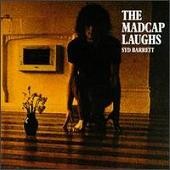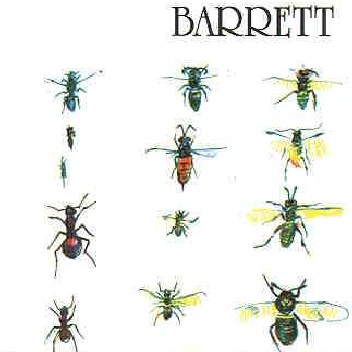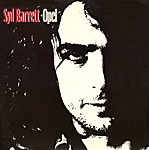After Syd Barrett broke with Pink Floyd, the band that he founded and led, his recorded solo work was assembled onto three albums: The Madcap Laughs (1969), Barrett (1970), and Opel (recorded 1968-70, released 1988/93). Herein is found a transcription of threnodic devotion, alienation, and madness comparable to that of the German poet Friedrich Holderlin (writing two hundred years ago).
“THERE ARE NO STARS”:
NOTES ON SYD BARRETT'S SOLO ALBUMS
(For Mark Pennings)
“A culture for which the unknowable is nonexistent is incapable of accepting the modernist text on its own terms or taking seriously its claim to proud uniqueness and intransitivity. The very anomaly and strangeness of the work cry out in social terms for commentary, normalization, criticism, and entry into or exclusion from a canon. Just as madness and other related nonconformity (crime, drugs, suicide, homelessness) invite the birth of a class of professionals that act to rationalize, reduce, or, as a last resort, exclude the perpetrators, so the anarchic in art supports a thriving industry that lives off attempts to explain it. The problematical work invites commentary by its very refusal to communicate…Its disorganization and disorganising potential mobilize the resources of a society– to channel, turn back, correct, and protect itself from its dangerous example and nerve, just as in other areas where the threat and / or promise of the unknown call forth the professionals whose function it is to “understand” such doings…An effective critical intervention can deprive the repressive social structure of the interdictory and exclusionary powers it needs to operate, at least insofar as this structure stands by means of consensual validation. Such a criticism may eliminate or render problematic, weak, and porous the quarantined category of the freak, the mad, the socially useless, the incorrigible, or the irreconcilable…
What commentary finally may reveal…are the very limits of knowledge, the inability of thought to cope with, judge, justify, and control its processes and products; for commentary finds blocking its progress, hegemony, and path those works that are impossible to fit into any preexisting or conceivable scheme or category, that reject glory while at the same time refusing oblivion, that resist definition as well as defy exploitation. These works point us towards an unattainable freedom, a nonexistent subject and desire…They carry out a dynamic strategy rather than express anything…into an indeterminate realm where everything is open to further exploration and doubt.”
~ Beitchman, “Madness, Theater, Text”. In Beitchman, Philip, I Am A Process With No Subject. Gainesville: University of Florida, 1988, pp. 225-228.
 Often, Barrett seems to be writing and singing from an indefinable distance, an interstellar emptiness so large and so dark that meaningful connection with another human being is impossible, and even conceivable only in quite banal terms. At the same time, there remains just enough of a connection to language and motor skills that the expression of this state is still powerfully realised. This work is perhaps unique even by 20th century (or 'modernist') standards, and such is its strangeness– its profound and haunting heterogeneity– that arguably the most astonishing aspect of this music is simply that it exists at all.
Often, Barrett seems to be writing and singing from an indefinable distance, an interstellar emptiness so large and so dark that meaningful connection with another human being is impossible, and even conceivable only in quite banal terms. At the same time, there remains just enough of a connection to language and motor skills that the expression of this state is still powerfully realised. This work is perhaps unique even by 20th century (or 'modernist') standards, and such is its strangeness– its profound and haunting heterogeneity– that arguably the most astonishing aspect of this music is simply that it exists at all.
“Ours is an age which consciously pursues health, and yet only believes in the reality of sickness. The truths we respect are those born of affliction. We measure truth in terms of the cost to the writer in suffering– rather than by the standard of an objective truth to which a writer's words correspond. Each of our truths must have a martyr. …But…The need for truth is not constant; no more than is the need for repose. An idea which is a distortion may have a greater intellectual thrust than the truth; it may better serve the needs of the spirit, which vary. The truth is a balance, but the opposite of truth, which is unbalance, may not be a lie.”
~ Sontag, “Simone Weil”. In Sontag, Susan, Against Interpretation And Other Essays. New York: Delta, 1966, pp 49-50.
Without wanting to make a martyr of this man (something already attempted in the later Pink Floyd's “Shine On You Crazy Diamond”)– both an ambitious, innovative musician and a classic 'acid casulty'– there is a sense in which what may be simply and inadequately called his 'madness' is the grounding principle in the principally groundless world of Barrett's solo work. It is what gives the magnetism, the pathos, and the singular, otherworldly quality to his words and the expression of them.
“The Poet makes himself a seer by a long, gigantic and rational derangement of all the senses. All forms of love, suffering, and madness. He searches himself…He reaches the unknown, and when, bewildered, he ends by losing the intelligence of his visions, he has seen them.”~ Arthur Rimbaud, Letter to Paul Demeny, 15 May 1871. In Fowlie, Wallace (trans. and ed.), Rimbaud: Complete Works, Selected Letters. Chicago and London: University of Chicago Press, 1966, p. 307.
As a rock star at his peak of his influence in the summer of 1967, Barrett inherited the essentially Romantic tradition of musician as Dionysian leader; the “Mad God”; the catalyst to a visionary state of being. He was, unquestionably, a victim of the forces that cast him in this role, forces that included his own desires. Perhaps no other modern musician (Jaco Pastorious ? Brian Jones ? Charlie Parker ?…) spent so much time dwelling on the perimeter between sanity and what is impossible to report upon.
“Perhaps the writer is less sensitive than his audience. That is, he reacts with less intensity to experience than people who are not creative. Thus the writer, seeing coldly, but able to see, touches upon matters which move him very little, and move his audience much.”~ Norman Mailer, “Lipton's”. In Halpern, Daniel (ed.). Antaeus: Literature as Pleasure. London: Collins Harvill, 1990, p. 259.
 The intensity of fragmentation and isolation within Barrett's psyche is evident in the musical 'arrangements', but we hear this more in the shocking lack of emotion with which he sings, even when the lyrics speak of the most tragic states of loneliness and apathy. His voice very occasionally hints at a sly, subtle, and self-aware playfulness, but what disturbs our normal sense of comfort in the familiar artist-audience inter-relation is the all-but-complete absence of feeling where feeling would usually be expressed.
The intensity of fragmentation and isolation within Barrett's psyche is evident in the musical 'arrangements', but we hear this more in the shocking lack of emotion with which he sings, even when the lyrics speak of the most tragic states of loneliness and apathy. His voice very occasionally hints at a sly, subtle, and self-aware playfulness, but what disturbs our normal sense of comfort in the familiar artist-audience inter-relation is the all-but-complete absence of feeling where feeling would usually be expressed.
At other times, as is in the original version of “Octopus” entitled “Clowns and Jugglers” (Opel), there is an attempt to supply the words with 'feeling', succeeding only in conveying a terrible desperation, and in which we hear an unhinged quality we would perhaps prefer to ignore, but cannot.
Mostly, though, it's as if the singer sings the words only because they're in a song. Often, there is the unmistakable air of the well-trained circus act going through the motions, and we hear a boredom (sometimes verging on self-disgust) in the performances of the songs, but perhaps even more clearly in the spoken introductions to the music and the terse conversations with those in the recording studio (most evident on Opel).
That these have been included in the packaging of Barrett's work can further induce the irresponsible guilt of the voyeur at the freak show, but also indicate the desire– both respectful and exploitative– to show the artist as fragile human being, accursed poet, and triumphant visionary.
” 'What I am speaking of is the absence of any mental lapse, a sort of imageless, feelingless, cold suffering, which is like an indescribable collision of abject failures.' ”~ Letter of Antonin Artaud. Quoted by Maurice Blanchot, “Artaud”. In Holland, Michael (ed.), The Blanchot Reader. Oxford, UK, and Cambridge, USA: Blackwell, 1995, p. 131.
This is a music that is a kind of anti-music, in that it often (perhaps almost completely unintentionally) refuses to utilise the traditions of consistency of tempo and regular time, or the use of standard key signatures (making accompaniment problematic), and which exhibits an indifference and even disdain for the means necessary to create the music. [Cf. the characteristics of “antiliterature”, in Beitchman, op. cit., p. 217.]
The mumbling, the improvised codas, the moans, the page-turning, and the exasperated exclamations and weary sighs one hears are evidence of a once more-than-competent musician now clearly struggling with the process of playing his own music.
“Metamorphose. An object is cut off from its name, habits, associations. Detached, it becomes only the thing, in and of itself. When this disintegration into pure existence is at last achieved, the object is free to become endlessly anything.”~ Morrison, Jim. The Lords / The New Creatures. London: Omnibus Press, 1985, p. 27.
 Barrett very often seems to experience reality as pure subjectivity; there is no separation between himself and the objective world: he becomes the object. Here, though, there is no freedom to chose, to discriminate, or to orientate attention or direction, and eventually too much light becomes blinding, and everything is seen, but within a kind of visual white noise.
Barrett very often seems to experience reality as pure subjectivity; there is no separation between himself and the objective world: he becomes the object. Here, though, there is no freedom to chose, to discriminate, or to orientate attention or direction, and eventually too much light becomes blinding, and everything is seen, but within a kind of visual white noise.
“In what sense, in what direction, can a person whose meanings and directions have evaporated change? What remains if not the one thing still left to do: repeat oneself? …when there is nothing left to cling to, a man can only grab onto himself, the principle of identity. “I am I” is a fundamental principle not only of logic but also of the ultimate right of humanity; and when everything else disappears…loyalty to oneself appears to be the last law we can still obey…”~ Gombrowicz, Witold, Diary, Volume Three (trans. Lillian Vallee). Evanston: Northwestern University Press, 1983, p. 49.
Barrett sounds like a man who has lost himself and his sense of connection with music, the world, and the woman he claims to love. When he first sings the words “I'm TRY—-ing” in “Opel”, this comes after he has changed chords no less than thirty times, seemingly in order to find the right one. In the haunted, drawn-out semi-tone fall of this phrase is all the melancholy and fatalism of one who sees himself as either failing in the future and having failed in the past, or as one who is not the same one who has tried before, and will try again.
In this final section of the song– perhaps the most wounded and wounding few minutes in his whole oeuvre– he simultaneously sings to himself, his lover, and his audience. And at the same time, he is singing beyond all this, to none of this; he sings in order not to think of himself, in order not to think at all, to rid himself of himself, and to achieve brief union with song.
“The renunciation of the unity of the “I” has its counterpart in the assertion of a new status for the “thou” of the other.”~ Todorov, Tzvetan, Mikhail Bakhtin: The Dialogical Principle (trans. Wlad Godzich), Manchester: Manchester University Press, 1984, p. 104.
By far the most repeated phrase in Barrett's writing is “all for you”. It is sometimes even used at the end of lines seemingly just to complete the metrical form of fill the necessary auditory space. This “you” changes its content (or lack thereof) from a particular woman, to an unspecified woman, to an imaginary woman, and, perhaps, to what is only us: the one listening. What is most significant, though, is not who or what is being addressed, but that the gesture towards the other is, once again, lacking in an external expression of depth of feeling. The other is necessary, but if the 'I' is an 'other', there is an extra figure between the 'you' and the 'I', so the seer (voyant) becomes merely a watcher (voyeur).
Barrett's own words can be brought in here, as if quoted back at the man himself: “…it's what I got / It's what I wear, it's what you see / It must be me, it's what I am !' (“Vegetable Man”, unreleased); “What can anyone mean to you / Standing in the Milky Way ? / Take life easy / Why so empty ? ” (“Milky Way”, Opel); “Just searching you even try /.http://cordite.org.au/ When I live I die // They even see me under call / We under all, we awful, awful crawl // Because of you, to see me be.” (“No Man's Land”, The Madcap Laughs).
“Our life no longer consists in living divine life, but in dreaming it. Thus the meaning of night becomes apparent, and the truth of derangement: it is a power whereby, in an empty time, we can still communicate with the divine.…The poet is the intimacy of distress; he lives the empty time of absence profoundly, and in him error becomes the deep of derangement, where he recaptures steadfast strength, the spirit at its freest point. That is the original power for which he bears witness and to whose possibility he attests, by founding it.”
~ Maurice Blanchot, “Madness par excellence”. In Holland, op. cit., pp. 121-122.
The dark in which Barrett drifts finally becomes starless: essentially, nothing is more attractive than anything else; there is no order, therefore nothing by which he can place himself in space or time. He floats, stumbles, moves about aimlessly, desiring next to nothing, and finds himself speaking when he has nothing to say, and so he says what he says from an immaculately obscure logic– persistent nevertheless– which compels us to listen, compelling all the more because of its alien, impassive intensity.
“We witness the unknown passing through art, and the effect is such that we are tempted to define art as that which invites and allows the unknown to gather there.”~ Kevin Hart, “After Poetry 17, A Quaterly Account of Recent Poetry”. In Overland, 131, Winter 1993, p. 42.
One of the most timely lessons one senses in Barrett's solo albums is the freedom of expression available to the artist when they no longer care how their art will be judged– when there's nothing left to lose– when the art is not considered as 'product'– when the artist either aims their creation at nowhere in particular or somewhere beyond the audience, so the audience has to also go beyond themselves in order to find the reason the art exists. The artist then truly becomes, through their example, one who allows us to liberate ourselves.
“In the respect we pay to such lives, we acknowledge the presence of mystery in the world– and mystery is just what the secure possession of the truth, an objective truth, denies. In this sense, all truth is superficial; and some (but not all) distortions of the truth, some (but not all) insanity, some (but not all) unhealthiness, some (but not all) denials of life are truth-giving, sanity-producing, health-creating, and life-enhancing.”~ Susan Sontag, “Simone Weil”. In Sontag, op. cit., p. 51.
When something is 'of the stars' (de sidera) we desire it (desideratus); when there are no stars, we have no desires; when we have no desires we are ready to die, or be silent.













